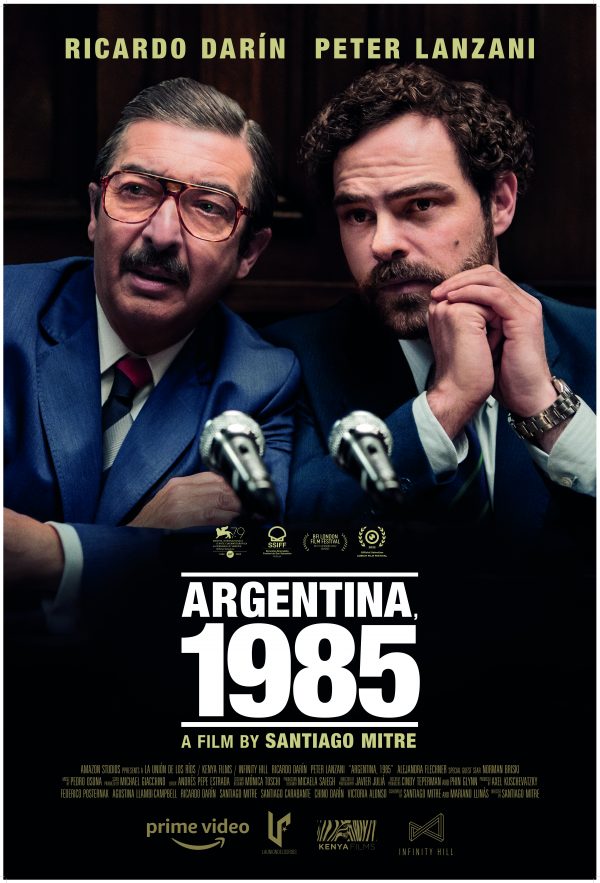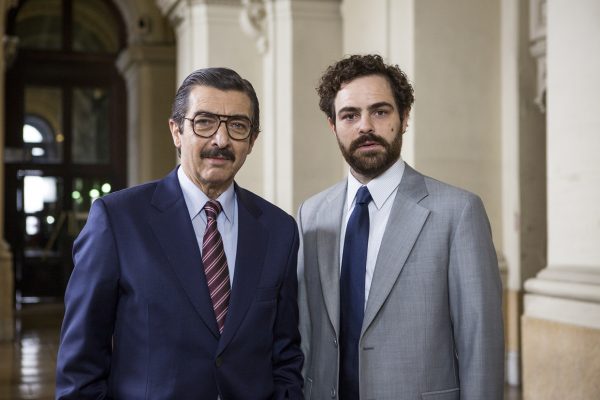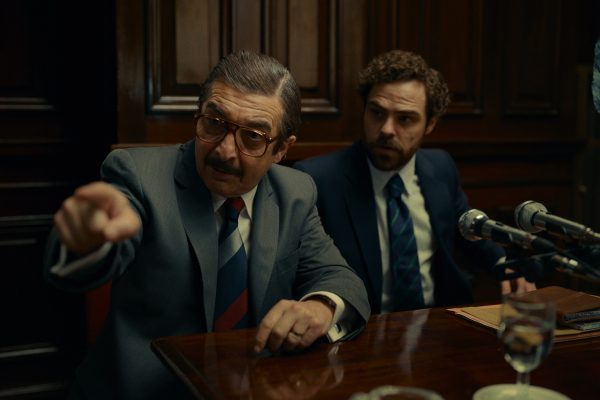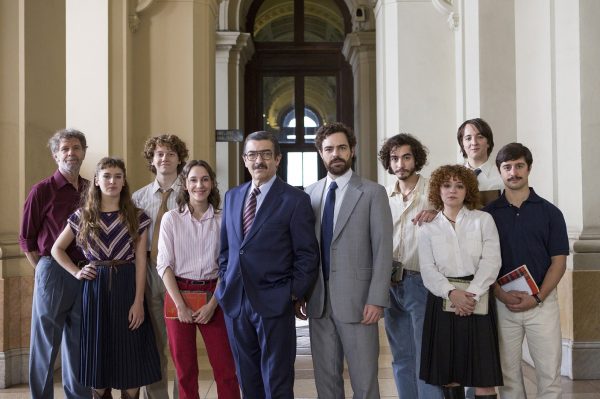‘Argentina, 1985’ shows us how to exceed ourselves

“Argentina, 1985” (2022). Cast: Ricardo Darín, Peter Lanzani, Alejandra Flechner, Santiago Armas Estevarena, Gina Mastronicola, Gabriel Fernández, Laura Paredes, Héctor Díaz, Norman Briski, Marcelo Pozzi, Joselo Bella, Susana Pampín, Paula Ransenberg, Andrés Zurita, Nacho Miguens, Pepe Arias, Natalia Olabe, Fernando Gonet. Director: Santiago Mitre. Screenplay: Mariano Llinás, Martín Mauregui and Santiago Mitre. Web site. Trailer.
With the military overthrow of President Isabel Perón in 1976, Argentina was plunged into a dark, nearly decade-long dictatorship in which right-wing authorities persecuted countless alleged opponents (mostly innocent civilians and their families) with kidnapping, torture, sanctioned murder and “disappearances.” These brutal practices, part of what was known as “the Dirty War,” went on virtually unchecked for years, leading much of Argentine society to perpetually live in fear. However, over time, with growing opposition, the ruling military junta began losing power and was eventually deposed in 1983 after its defeat in the Falklands War and the ascent of a new democratically elected president.
In the wake of this reign of terror, calls were raised to prosecute those responsible for the rampant, unbridled abuse. However, military courts refused to take on this task, leaving prosecution in the hands of civilian authorities, who were also hesitant to proceed. After all, just because the military autocrats were officially out of power with the collapse of their so-called “last junta,” that didn’t mean that their considerable influence had completely disappeared, clandestine though it may have been by that time. Which is why Argentine public prosecutors were generally reluctant to undertake cases against their former leaders – they didn’t want to experience the same fate as the mysteriously disappeared as a result of their litigious actions, despite widespread support for such trials.
To overcome this conundrum, officials of the new government decided to try a different approach – conducting a trial in Argentine civilian appeals court. The proceeding against the nine defendants was to be presided over by a panel of six judges, with the accused represented by a smug, supremely self-confident lead defender (Héctor Díaz). But finding a suitable public prosecutor was a bigger challenge, since most were unwilling to subject themselves to the potential dangers of taking on such a provocative case. So who would end up being the “lucky” choice?
That responsibility fell to Julio César Strassera (Ricardo Darín), a longtime prosecutor who was reluctant to take on the task when approached by his boss (Gabriel Fernández). He was concerned about his personal safety, as well as that of his wife, Verónica (Gina Mastronicola), and his children, Silvia (Alejandra Flechner) and Javier (Santiago Armas Estevarena). And, to complicate matters, he worried about criticism (and possible retribution) from both sides in this fight – from supporters of the accused, for taking on this controversial prosecution, and from friends and relatives of the victims, for having often turned a blind eye toward the junta’s atrocities (or, in some cases, even tacitly aiding and abetting the perpetrators) during the height of the Dirty War, prompting them to wonder how diligent he would be in pressing this case. He thus saw his involvement in the upcoming trial as a no-win situation and one possibly fraught with dire consequences.

Assembling a prosecutorial team proved problematic, too; most of his peers flat-out refused to assist him. Strassera consulted a trusted mentor (Norman Briski) for advice, but he mostly confirmed what the prosecutor already knew, despite the sincere, hopeful encouragement he offered. And, when Julio finally learned (ostensibly by accident) who would be aiding him, he discovered that his principal associate, Luis Moreno Ocampo (Peter Lanzani), had little experience in such matters. Despite the ample enthusiasm for seeking justice that Luis brought to the table – a quality that made him something of a pariah within his conservative circle of family and friends – that fervor inspired little confidence with Julio considering what they would be up against.
Nevertheless, even though Ocampo was still rather new to all this, he brought fresh approaches and inventive ideas on how to proceed. He put together an eager team of law students to gather evidence on a tight time frame, and they employed a variety of aggressive, innovative and persistent tactics to assemble the proof for their case, in significant detail and on time. Julio was duly impressed by what they accomplished, and their achievements did much to boost his morale. In a relatively short time, he changed his outlook as the prospects suddenly no longer looked as bleak as they once did.
When the case went to court in April 1985 in what would become known as the Trial of the Juntas, Strassera and his colleagues presented 709 claims to the tribunal, 280 of which were heard, involving 833 witnesses. It would turn out to be the first war crimes proceeding to be conducted since the Nüremberg Trials held in Germany after World War II and one of the largest-ever prosecutions of its kind.
The depth of material collected took the defense team somewhat by surprise; they hadn’t expected that the prosecution would be able to gather so much evidence, in such detail, from what they assumed would be inherently reluctant witnesses. (So much for assumptions.) But, even with such a battery of damning testimony and information, Julio and his colleagues could not rest on their laurels; they had to remain diligent in pressing their case. What’s more, they had to do so under increasingly intimidating conditions, such as less-than-subtle surveillance, death threats and bomb scares, as well as a number of explosive detonations successfully set off in government facilities.
If anything, however, these threats helped to steel the prosecutors’ resolve to carry on. That confidence was further bolstered by the detailed, explicit testimony of witnesses, such as Adriana Calvo de Laborde (Laura Paredes), who presented a heartbreaking account of her time in junta captivity. The savage treatment she and her newborn child experienced at the hands of authorities at the time was so severe and so perverse that it stunned even a public that was already all too familiar with the willful cruelty and unspeakable barbarity that went on. It did much not only to galvanize the indignation of those seeking justice, but also to change the minds of many who were sympathetic to the defendants, such as Luis’s staunchly conservative mother (Susana Pampín), a onetime-diehard critic of her son’s allegedly bleeding heart leanings.
The Trial of the Juntas marked a significant turning point for the global human rights movement, as well as for promoting the development of democracy in Argentina. It may not have solved all of the nation’s problems, and it may not have made up for all of the painful losses experienced during the days of the junta. But it went a long way toward setting matters on a new path, and it was achieved by a group of determined, courageous individuals who didn’t think it could be done. There’s much to be said for that, and this film truly does justice to their story and the legacy it has established.

Perhaps the most obvious benefit in this is learning how to overcome one’s fears, even those that arise as a result of potentially dangerous conditions. As the film clearly illustrates early on, Strassera was obviously spooked about what he might face if he were to take on this case, both for himself and his family, as well as for those he would be asking to testify in this proceeding. Many of them had already experienced considerable pain, anguish and terror, and encouraging them to tell their stories would mean reliving it all over again, not to mention the possible retribution they could face from supporters of the accused for speaking out.
However, if justice were to be served, getting past those apprehensions was essential, even in the face of physical harm, damage to one’s reputation, and threats to loved ones and colleagues, dangers that many of those involved here had already experienced during the Dirty War. This meant mustering courageous convictions to see this through, believing in their power and potential for fostering their sought-after outcomes. And, amazingly, as their faith in these notions grew and fell into place, so, too, did the results they so dearly hoped for. That’s impressive, especially since they arose from something as unexpected as changes in their beliefs, intangible resources that may have been hard to quantify and fully appreciate but that nevertheless packed quite a powerful punch when put into place.
This, in itself, sheds significant light on another of those takeaways – the value of overcoming limitations and believing in what such measures can accomplish. As the discovery process for this proceeding began, Julio had huge doubts about whether the case could be successfully brought to pass. But, thanks to the innovative steps that Luis and his associates implemented, seemingly miraculous results emerged, outcomes that clearly defied expectations and provided the means needed by the prosecutors to effectively make their arguments in court. Indeed, as unrealistic as believing in miracles sometimes might be, doing so can yield unexpectedly stupendous results.
Obviously, developing and possessing skills like these are important to those in professions like law, where putting them to use to achieve successful outcomes is crucial to their very reason for being. But these notions are just as important in myriad other contexts, both personally and professionally, as well as in the everyday conduct of our lives. These principles might not seem like takeaways from a court proceeding, but the foundation underlying success in these undertakings is applicable to a host of activities that have nothing directly to do with the law. We can learn a lot from these examples – and we can achieve even more for ourselves when we put them into use in our own world. All we have to do is believe in the possibilities and then act on them.
Such realizations can carry tremendous benefits for those who experience them. When we become aware that we’re genuinely capable of attaining more than we thought we could, this understanding can significantly boost our confidence, self-esteem and sense of personal power. This becomes apparent in what both Julio and Luis experience over the course of the film. Luis is able to verify what he already knew about himself, an affirmation of his abilities and insights. But Julio is arguably an even greater beneficiary of this, as he comes to realize that he possesses skills he never knew he had, that he was indeed capable of rising above his own perceived limitations and achieve more than he ever thought he could. Now that’s empowerment.

Seeking justice is certainly a noble pursuit, especially when the transgressions calling for it have been particularly egregious. But it can also become a rather precarious endeavor when conducted under conditions that carry potentially serious consequences. Still, there’s always justice to be had, and its fulfillment is crucial to fostering reform, promoting healing and encouraging the emergence of a stable future, especially in a setting like the new Argentinian republic depicted in this film. Writer-director Santiago Mitre’s latest presents a thorough, capably told account of this courageous venture, with a solid screenplay and fine performances that effectively depict the dangers, ironies and nuances involved in this tightrope-like endeavor, as well as the personal impact on its principal figures. The film could stand a little tightening in spots, and some of the background music doesn’t always fit. But, in all, this is an engaging, attention-grabbing project that successfully avoids legal jargon and excessively detailed political considerations while revealing much about one of history’s most compelling judicial proceedings, one that, sadly, echoes the same sentiment to have come out of most such landmark events – “Never again.”
“Argentina, 1985” is one of those films that has flown beneath the radar thus far, receiving little fanfare and not attracting much attention among moviegoers, including avid cinephiles. However, with the onset of movie awards season, the picture is finally garnering the recognition it so genuinely deserves. It’s been named a nominee in the best foreign language film category of the Golden Globe and Critics Choice Award competitions. In addition, the National Board of Review has selected it as one of 2022’s Top 5 International Films and as the winner of the organization’s Freedom of Expression Award. Also, the film was recently named to the short list of candidates for the Academy Award for best international film. Not bad for a film that not many have heard of. The picture is currently available for streaming online.
Case closed.
Copyright © 2022, by Brent Marchant. All rights reserved.



